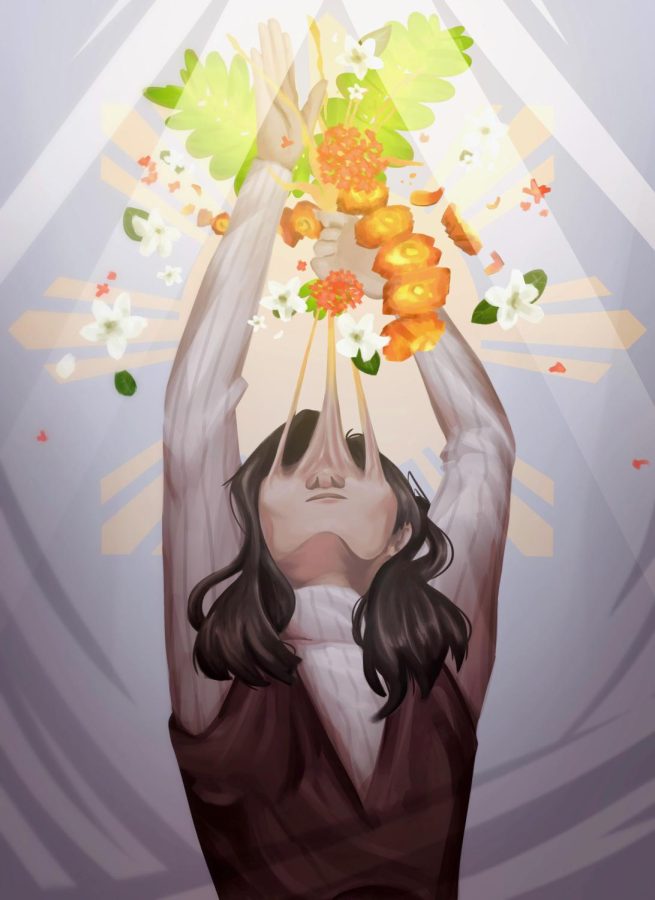Should our generation make more of an effort to keep in touch with cultural roots?
Original graphic by Yzabelle de Luna
March 17, 2023
Kumusta—that’s how you say “hello” in Tagalog. But as a second-generation immigrant of Filipino parents, that’s not something I knew off the top of my head; I had to google it. Twice. I didn’t even know how to say a simple hello in my native language, and I could only maybe tell you about 10 or so other words that I’ve picked up on over time.
Think about your peers—how often do you see others expressing their culture?
Maybe you’ve heard murmurs of a different language in the hallway or someone bringing a snack you’ve never seen before, but how much have you heard about their culture? The beliefs, the customs, the history behind it all; is it encouraged in today’s world to keep in touch with these parts of yourself? Or is it more beneficial to run away from your culture and assimilate into the conforming norms of today’s society?
Is our generation becoming too culturally disconnected?
Yes, I think it is, whether we’re aware of it or not. But does that mean we should try to take more efforts to preserve our culture?
I’ve always found myself being uninterested in taking the time to learn things about my culture, a lot of which I think can be attributed to our generation growing up in the digital age. Information can be spread faster now than ever before from all different walks of life; anyone can say anything they want, and now everyone has access to it. You’re able to hear the thoughts and opinions of people from a country thousands of miles away just from the comfort of your own home, a feat that seemed impossible even just a few decades ago.
In theory, this seems like a good thing for preserving cultural traditions. We’re able to hear the voices and perspectives of cultures that we may not have even known existed beforehand. People online have created countless communities on social media platforms celebrating cultural diversity and preaching staying true to yourself.
The resources are out there now to educate oneself on other cultures in more accessible ways than ever before. But of course, there’s always many more sides to consider. While social media has allowed for many people to share their perspectives, it’s also brought about an increase in the globalization of pop culture.
The internet has allowed the world to become increasingly interconnected, which may seem like it would only promote diversity. However, it also promotes conformity into a shared global culture.
Our world is moving more towards relying on technology, as it simply just makes everything easier. Not only in the way that it provides convenience for many menial tasks, but it also makes interactions with others much easier when both parties can draw from a shared culture, one that is fostered by the existence of the internet.
It’s easier to talk to people who speak the same language and slang as you, who understand the same references as you, who seem to have grown up in the same environment as you, even if physically you were thousands of miles apart. I think that, subconsciously, this has made our generation averse to differences because it’s so easy nowadays to avoid them and find others with the same exact mindset as you.
Algorithms aren’t designed to promote diversity, they’re designed to show you content that you agree with in order to keep you on platforms for longer. It’s fostered an environment in which many of us can easily seek comfort in a familiar setting rather than one made up of different perspectives, and it’s an attitude that I’ve found myself turning on my culture.
As someone who was raised on a computer and an iPad, it seemed so much easier to surround myself with kids who had grown up in that same environment rather than trying to understand my Filipino culture, one I wasn’t really raised in.
The simple fact of the matter is that I was raised as an American, not as a Filipino; after all, my parents immigrated here to give me better opportunities and education, not to relocate their practices and use me as a missionary for their culture.
However, it caused me to become extremely disconnected with that part of me—I always hated going to Filipino traditional ceremonies because why do that when I could stay home and watch TV, which I could go talk with my friends about tomorrow? Why bother to learn Tagalog when English gets you along just fine, if not better?
I’d find myself surrounded by my Filipino relatives and feel completely out of place. I shared the same skin, but deep down, I felt completely different. I’d watch my cousins and family friends speak Tagalog and partake in these traditions ingrained into their minds and I’d choose to watch from the sidelines.
I felt as if I didn’t belong to something that I was supposed to be connected to by birth, yet it felt like they had a shared past that I was never a part of. There’s a sense of loss in it that I’ve only become aware of recently, that loss of not only not quite belonging but a loss of what more I could have been.
It can be extremely isolating to be caught between two worlds, two that you feel like you’re indebted to belong to, but you’re somehow shunned out of both. So it made me wonder—what’s the point in preserving my culture? What’s the point in trying to preserve a culture that you don’t even feel a part of when running away from it seems like it’d bring you so much more?
While it may seem easiest to just allow yourself to be consumed by global culture, the discovery of a culture from which you came is a process that cannot be understated.
Other cultures hold stories and messages that provide a completely different perspective on the world—if we just leave that behind, we leave hundreds or even thousands of years of information behind with it. There may be secrets to the world we can’t even fathom simply hidden behind a language barrier, lessons that can only be learned through the retellings of past experiences.
What messages are hidden behind other cultural folk tales? Songs? Mythology? What did they know that was important enough to weave into stories, and what will we lose if we never listen to them?
If we want to try to make the world a better place, we must learn from those who came before us in order to see perspectives we’ll never get to experience. If we actually want to make a difference in our future, we have to hold on to those differences we’re born with that are necessary to bring about change.
Perhaps the next time you have the opportunity to talk to a parent or a grandparent, learn a bit about the culture they came from.
Not only will it help you rebuild a part of yourself, but it will help to build a society that’s truly made up of the lessons learned from the world’s past.













